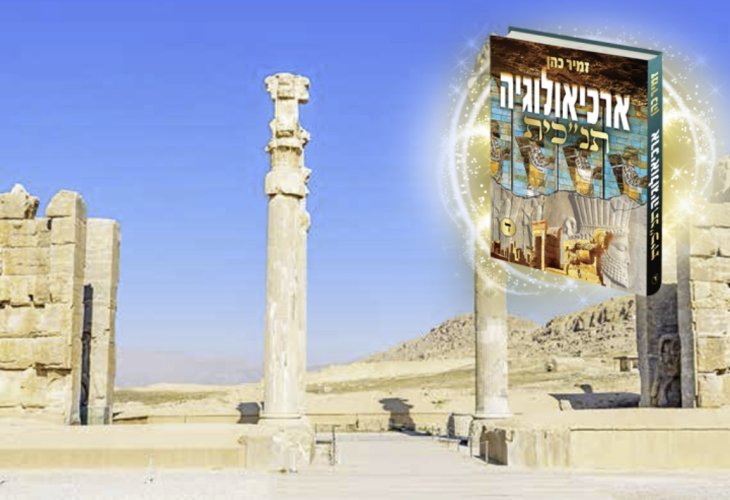Understanding Mordechai's Defiance: Insights from Persian Customs
Persian customs shed light on Mordechai's unique behavior. Plus, why did Haman cast lots at the start of Nisan?
 "And Mordechai sat at the king's gate" (Esther 2:21). These words are better understood in the context of Ahasuerus's palace gates.
"And Mordechai sat at the king's gate" (Esther 2:21). These words are better understood in the context of Ahasuerus's palace gates.At the beginning of Chapter 3, the Megillah describes the meteoric rise of Haman, the son of Hammedatha the Agagite, as King Ahasuerus elevates his status above all the other officials:
"After these events, King Ahasuerus promoted Haman son of Hammedatha the Agagite, elevating him and giving him a seat of honor higher than that of all the other nobles."
Researchers believe that the name Haman is derived from the Persian word hamayun, meaning 'magnificent' or 'great.' The name Hammedatha appears as the name of a witness in one of Artaxerxes's documents. The name of Haman's wife, Zeresh, was also found in a document from the city of Shushan.
After Ahasuerus placed Haman's seat above all the officials, Haman demanded the highest honor due to him in his new position, but Mordechai the Jew refused to comply. The Megillah describes the incident between them and the conclusion Haman drew from it:
"All the king's servants at the king’s gate bowed down and prostrated themselves before Haman, for that is what the king commanded concerning him. But Mordechai would not kneel nor pay him honor. Then the king’s servants who were at the king’s gate asked Mordechai, 'Why do you disobey the king’s command?' Day after day they spoke to him, but he refused to comply... because he had told them he was a Jew."
When Haman saw that Mordechai would not kneel or pay him honor, Haman was filled with rage. Yet he scorned the idea of laying hands on Mordechai alone, for they had told him of Mordechai’s people. Instead, Haman looked for a way to destroy all Mordechai’s people, the Jews, throughout the whole kingdom of Ahasuerus. In the first month, the month of Nisan, he cast the pur (that is, the lot)...
"And Mordechai sat at the king's gate" (Esther 2:21)
These words are clearer when considering the structure of Ahasuerus's palace gates.
They were not merely an entrance within the palace wall, but impressive structures in their own right, passed through by everyone entering the royal precinct.
The photographs on this page depict the king's gate at Persepolis, consisting of two tall rectangular gates, inner and outer, with a hall in between, destroyed in wars. Some of the columns that supported the hall's ceiling can still be seen.
The phrase "Mordechai would not kneel or pay him honor" is one of the most famous in the Megillah and has become an idiom representing steadfast refusal to submit under any circumstances.
Herodotus notes in his historical writings the following customs among the Persians: when two people of equal status meet in the street, they kiss each other instead of greeting. If one is of lower status than the other, he kisses the other on the cheeks; but if one is of much lower status, he falls to the ground before him.
This is precisely what we find in the Book of Esther: the king elevated Haman to a superior position above all the officials by commanding everyone, from the people to the highest officials, to bow before him: "And all the king's servants at the king’s gate bowed down and prostrated themselves before Haman, forthe kinghadsocommandedconcerninghim." But "Mordechai would not kneel or pay him honor." Researchers note: "When they asked him why, he merely told them he was a Jew. The scroll does not explain because, to the writer of the Megillah, as to the king’s servants, it was understood and known that Mordechai would not give divine honor to a human being—his Jewish faith forbade it."
However, it is worth mentioning what is explained by the Sages, that a figure of idolatry hung around Haman's neck. Without this, a Jew is allowed to bow to a person out of respect. His mere declaration of being Jewish was enough for everyone to understand that he could not bow to an idol.
Haman decided to take revenge on all Jews, perceiving Mordechai's refusal to bow and kneel to him as a religious stance common to all Jewish people. Thus, he decided to cast lots at the beginning of Nisan to determine the most favorable date to carry out his plan. Scholars have indicated that in Persia, as in the entire Ancient Near East, the start of the month of Nisan was considered the optimal time for casting lots, since according to their belief, it was on this day that their deities determined the fate of the world and humanity for the coming year.
"To Bring to the King's Treasury"
After casting the lot, Haman approached King Ahasuerus and proposed a large sum in exchange for his agreement to his plan regarding the Jewish people:
"Haman said to King Ahasuerus: 'There is a certain people scattered and dispersed among the peoples... let it be written that they be destroyed, and I will weigh out ten thousand talents of silver to those in charge of the king's business, to bring it into the king's treasuries.'"
Archaeological research has identified the remains of the "king's treasuries", the treasure house of King Ahasuerus, in the palace in Shushan as well as in Persepolis. In Persepolis, it was a large hall surrounded by a high wall with only one gate guarded by armed soldiers. It contained weapons and hundreds of ancient documents recording the treasures.
From the book "Biblical Archaeology Volume 4" by Rabbi Zamir Cohen Shlita, released this week in stores. To purchase the book, click here.

